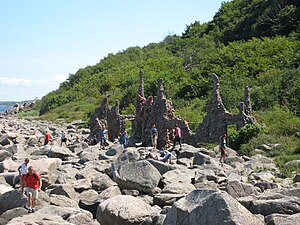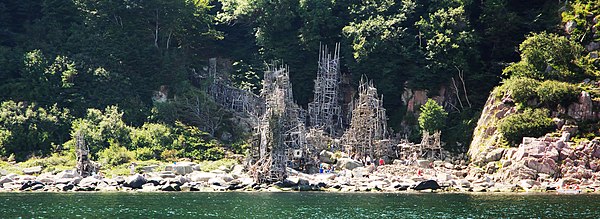Ladonia (micronation)
This article may rely excessively on sources too closely associated with the subject, potentially preventing the article from being verifiable and neutral. (April 2021) |
Ladonia | |
|---|---|
| Micronation (unrecognized entity) | |
 Location of Ladonia | |
| Area claimed | 1 km2 (0.39 sq mi) in Kullaberg, Sweden |
| Claimed by | Lars Vilks |
| Dates claimed | June 2, 1996–present |
Ladonia (Swedish: Ladonien) is a micronation, proclaimed in 1996 as the result of a years-long court battle between artist Lars Vilks and local authorities over two sculptures. The claimed territory is part of the natural reserve of Kullaberg in southern Sweden.[1]
History
[edit]In 1980, artist Lars Vilks began construction of two sculptures, Nimis (Latin for "too much", a structure made of 75 tonnes of driftwood) and Arx (Latin for "fortress", a structure made of stone), in the Kullaberg nature reserve in north-west Skåne, Sweden. The location of the sculptures is difficult to reach, and as a consequence they were not discovered for two years, at which point the local council declared the sculptures to be buildings, the construction of which was forbidden on the nature reserve, and demanded that they should be dismantled and removed. Despite the confrontations with the local council, a large percentage of the local community supports the sculptures, especially people working in the tourism industry.[2]


Vilks appealed the decision of the council, but lost. He appealed repeatedly, and finally the case was settled, in the council's favour, by the Swedish government. However, in the meantime Nimis had been bought from Vilks by the artists Christo and Jeanne-Claude after the death of Joseph Beuys, who bought it in 1984. On 2 June 1996, in protest of the local council, Vilks declared the area surrounding Nimis an independent, sovereign country named Ladonia.[3]
In 1999, another sculpture, Omphalos (named after Omphalos, a small sculpture in the temple at Delphi, "marking the centre of the world"), was created. It was made of stone and concrete, 1.61 metres high and weighing a tonne. The Gyllenstiernska Krapperup Foundation, formed to promote art and culture, accused Vilks of building this sculpture and complained to the police, and in August 1999 the district court ordered its removal. The Foundation had also demanded the removal of Nimis and Arx, but the court ruled against it. The Foundation appealed this decision to the Supreme Court, who eventually ruled against it. The police were unable to positively identify Vilks as the sculptor, but the district court held that he was.[citation needed]
The removal of Omphalos was itself controversial. Vilks was ordered to find an acceptable way to remove the sculpture. He proposed blowing it up on 10 December 2001, Nobel Day and the 100th anniversary of the Nobel Prize, and applied to the county council for permission to do so. The county council made a decision on 7 December, but kept it secret until 10 December. By that time, another artist, Ernst Billgren, had bought Omphalos from Vilks, and had requested that it not be damaged. In the early hours of 9 December, a crane boat was sent (by DYKMA, under contract from the Enforcement Administration) to the site and removed the sculpture (at a cost of SEK 92,500, billed to Vilks).[4] Despite the new owner's request, the sculpture was damaged by handling. In response to this, the Enforcement Administration was satirically declared[by whom?] to be "Performance Artist of the Year" in 2002.
Afterwards, Vilks applied to the county council again, this time for permission to erect a memorial in the place that Omphalos had stood. Permission was granted by the council to erect a monument no greater than 8 centimetres high. This was duly done, and the monument was inaugurated on 27 February 2002.
The ensemble Neurobash performed in Ladonia during the 10th Anniversary celebrations in 2006.[5]
In August 2022, it was announced that Ladonia would be hosting MicroCon 2023 in Chicago, Illinois[6] and in Ypres, Belgium.[7]
Government
[edit]
The government of Ladonia is jointly led by a Queen and a President. The President and Vice-President are elected tri-annually, while the Queen, once crowned, reigns for life. As of 2018[update] the position of President is held by Interim-President The President's Old Shoes, and the Vice-President position is vacant, pending new elections in 2019.[8] Vilks, the State Secretary, performs or oversees many of the day-to-day operations of the microstate, including processing new citizenship applications and posting photos and news items to the Ladonian online "newspaper". The Cabinet Ministers are the legislative body in Ladonia, and they participate in debates and vote on proposals via the Internet. Many Ladonian ministries have artistic connotations and whimsical names.[9] As of 2018 the Cabinet of Ladonia has voted to amend the constitution to create the position of Prime Minister. The PM candidates will be nominated by and selected from current members of the Cabinet. The amendment abolishes the positions of President and Vice-President. This move was made as a way to prevent the election fraud that occurred in the previous election.
Regarding diplomacy of Ladonia's government the following can be noted. In 2008 the Ladonia Herald announced, through Vilks, that Ladonia recognized KREV, Tibet, the Bjorn Socialist Republic (another Swedish micronation, which recognizes Ladonia), Lakota nation, South Korea and universally recognized countries like, inter alia, Italy, Russia and United States. Regarding Sweden the "Ladonia has de facto recognized this country as 1) we are at war with Sweden, and 2) we have a consulate and have had an ambassador". Still, Ladonia did not believe that Sweden "really exists" as it "has never been proclaimed".[10]
Demographics
[edit]When it was created, Ladonia had no population. As of 2020, there are 22,858 Ladonian citizens from more than 50 countries. None of the citizens resides within Ladonia's borders,[11][12] although there has been at least one resident citizen in the past.[13]
A comparison can be drawn between Ladonia accepting online citizenship applications and the e-Residency of Estonia. This virtual residency program shows how established nations may also adopt similar strategies to micronations, providing an example of what citizenship might look like in postnationalism.[14] According to the Höganas Visitors Bureau, about 40,000 people visit Ladonia each year.[15]
Nimis
[edit]Nimis is a series of wooden sculptures situated along the coast in the Kullaberg Nature Reserve, Höganäs Municipality, in the northern part of Skåne County, Sweden. They are a massive, wooden labyrinthine structure connected by several wooden towers, and are said to be mostly constructed from driftwood.
They were begun by the artist Lars Vilks in 1980 and have been the subject of a long-running legal dispute between the Swedish authorities and the artist. As no permission was given to build on the site within the nature reserve, the County Administrative Board in Skåne has sought to have Nimis demolished, despite the fact that it has become a popular tourist attraction.
As Nimis's existence is not sanctioned by Sweden, it is difficult to find – there are no official sign posts in Sweden, nor is it marked on maps. However, it can be found on Google Maps.[16] It lies a few kilometres northwest of the town of Arild and somewhat farther from the town of Mölle, and can only be reached on foot following a well-worn path with yellow Ns painted on trees and fences. The path begins as an easy stroll past Himmelstorp, a well-preserved eighteenth-century farmstead, but quickly becomes a steep and rocky climb down to the coast. Reportedly, thousands of local and international tourists visit Nimis each year, especially during summer.[17][4]

Notes
[edit]References
[edit]- ^ Foer, Joshua; Thuras, Dylan; Morton, Ella (2016). Atlas Obscura. New York, NY, USA: Workman Publishing Co., Inc. p. 24. ISBN 978-1-5235-0648-4.
- ^ Paíno, Alba Cano; Pocasangre, Ana Vilma Henríquez; Suárez, Daniel Martínez. "European Charter for Sustainable Tourism in Kullaberg Nature Reserve – Preliminary diagnosis" (PDF). Kullaberg Nature Reserve. Archived from the original (PDF) on 3 January 2019. Retrieved 3 January 2019.
- ^ "History of Ladonia". Ladonia.
- ^ a b Scherdin, Mikael (2011). Art Entrepreneurship. Zander, Ivo. Cheltenham: Edward Elgar Pub. ISBN 9781849808507. OCLC 714568589.
- ^ Hallerton, Sheila; Hill, Matt (15 April 2019). "Soundtracking a Micronation: Neurobash's engagement with Ladonia" (PDF). Shima: The International Journal of Research into Island Cultures. doi:10.21463/shima.13.1.11.
- ^ "MicroCon 2023". Encyclopedia Westarctica. Retrieved 14 November 2022.
- ^ Martinez, Olivier (13 August 2023). "MicroCon EU 2023, a very informative edition". Microcosme.info (in French). Retrieved 5 December 2024.
- ^ "The President and Vice President". Ladonia. Archived from the original on 28 July 2021. Retrieved 29 October 2018.
- ^ "The constitution of Ladonia – Ladonia State Affairs". Ladonia New Herald. 9 July 2009.
- ^ "Ladonia recognizes BjornSocialist Republic". Ladonia Herald. 23 April 2008. Retrieved 2 March 2022.
- ^ "Ladonia | The Proud, Free, and Interactive Micronation".
- ^ Ladonia's population chart on www.ladonia.org
- ^ Lars Vilks (29 November 2009). "President Election: Candidates – Election 2010". Ladonia New Herald. Retrieved 14 April 2015.
- ^ Keating, Joshua (26 June 2018). Invisible countries : journeys to the edge of nationhood. Nelson, Bill (Cartographer). New Haven. ISBN 9780300235050. OCLC 1041140240.
{{cite book}}: CS1 maint: location missing publisher (link) - ^ "Ladonia".
- ^ "The Royal Republic of Ladonia on Google Maps".
- ^ Stebleton, Michael (2016). "Challenging Students to Become Reasonable Adventurers". About Campus: Enriching the Student Learning Experience. 21 (4): 14–21. doi:10.1002/abc.21246. S2CID 151511833.
Sources
[edit]- "Omphalos". Moderna Museet. Archived from the original on 27 September 2007. Retrieved 14 July 2005.
- "Filippa Kihlborg in Ladonia". Retrieved 14 July 2005.
- "Visa for Ladonia". The Power of Culture. 3 April 2002. Archived from the original on 27 September 2007. Retrieved 13 June 2005.
- "Pakistanis' 'new life' in imaginary country". BBC News. 11 March 2002.
- TT Spektra (3 July 2006). "Påhittat land fyller tio år". Svenska Dagbladet (in Swedish). Archived from the original on 20 May 2007. Retrieved 1 August 2006.
- Truc Olivier (14 March 2002). "Le pays virtuel qui attire 3000 réfugiés". Libération (in French). Archived from the original on 19 August 2012. Retrieved 21 April 2009.
External links
[edit]- Official website

- The Ladonia New Herald
- The Office of Nothingness, which also manages the 1st chamber of the Ladonian Parliament
- The Ministry of Hunting and Game preservation
- The Ministry of Art and Jump
- The Ministry of Undisclosable Purpose
- The passports of the Minister of Duct Tape and High Voltage, the Minister of the Dark Side, the Minister of Holidays, and the Minister of Unnumbered Things.
